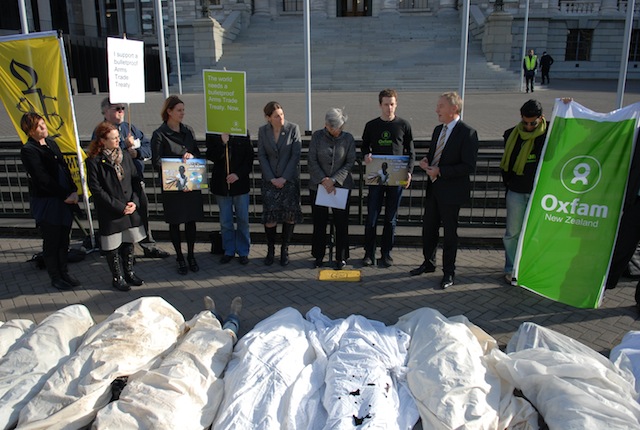On Friday evening (27 July 2012) at precisely the same time as the spectacle of the Olympics opening ceremony was kicking off in London, across the Atlantic in the basement of the United Nations another spectacle was unfolding as talks aimed at regulating arms transfers collapsed. The president of diplomatic negotiations tasked with concluding the proposed Arms Trade Treaty, Ambassador Roberto García Moritán of Argentina, declared defeat and closed the conference without adopting the final treaty text, stating, “I take full responsibility, and apologize deeply for not having brought you to a better ending.”
Earlier in the day, the United States had announced that it needed more time to consider the proposed text of the treaty, and Russia and China then also asked for more time. Despite this warning, many states remained confident that the text could still be adopted given the significant concessions made to accommodate US demands on the draft text.
The International Commiittee of the Red Cross described the final text as “a strong response to the humanitarian problem and a reasonable compromise” following the four weeks of negotiations and years of prepatory meetings and consultations. Describing the objective of an Arms Trade Treaty as “a humanitarian imperative,” the ICRC said the text would have required that states “assess the risk that the conventional arms and ammunition they transfer would be used to commit serious violations of humanitarian law and human rights law – and to deny a transfer if an overriding risk exists.”
In the closing session, Mexico read a statement endorsed by 90 states expressing disappointment and calling on the president to report to the UN General Assembly later in 2012 on the progress made at the negotiations “so that we can finalize our work.” In remarks to media, Amb. Moritán said he was confident a treaty could be agreed by the end of the year.
The US did not speak in the closing plenary, but a few hours later claimed that the negotiations “ran out of time to reach consensus” and expressed US support for “a second round of negotiations, conducted on the basis of consensus … next year.” The US firmly rejected adopting the text at the UN later in 2012, stating “we do not support a vote in the UNGA on the current text.” The US presidential election is scheduled to take place on 6 November 2012.
Despite the disappointing result in New York, several outcomes now look possible for the conclusion of an Arms Treaty. States may vote to adopt the final treaty text when it is submitted to the UNGA by Amb. Moritán later in the year. Or they may take up the US proposal of another consensus-based round of negotiations at the UN in 2013. Both are “inside” the UN options, as opposed to like-minded states undertaking a process “outside” UN auspices to agreed on the text, which has been endorsed by UN Secretary General Ban Ki-moon and other high level UN officials.
For the Control Arms coalition of non-governmental organizations that has been campaigning for effective regulation of the arms trade for the past decade, the need to conclude negotiations on an Arms Trade Treaty is a matter of urgency. Amnesty International has cited the treaty’s potential to “save some of the 500,000 civilian lives lost each year in armed conflict.”
From the failed negotiations an alliance of governments and NGOs has emerged with a large number of states supporting the objective of a strong treaty as soon as possible. As the ICRC noted, “an overwhelming majority” of states now “support a norm” requiring them to “not transfer conventional weapons to those who are likely to use them to commit war crimes or serious violations of international human rights law.”
In the interim, on the road to the eventual treaty, there is nothing to hold back states from adopting stronger domestic standards to control arms transfers, including the “strict measures” they were prepared to adopt in New York in July 2012.


Leave a Reply